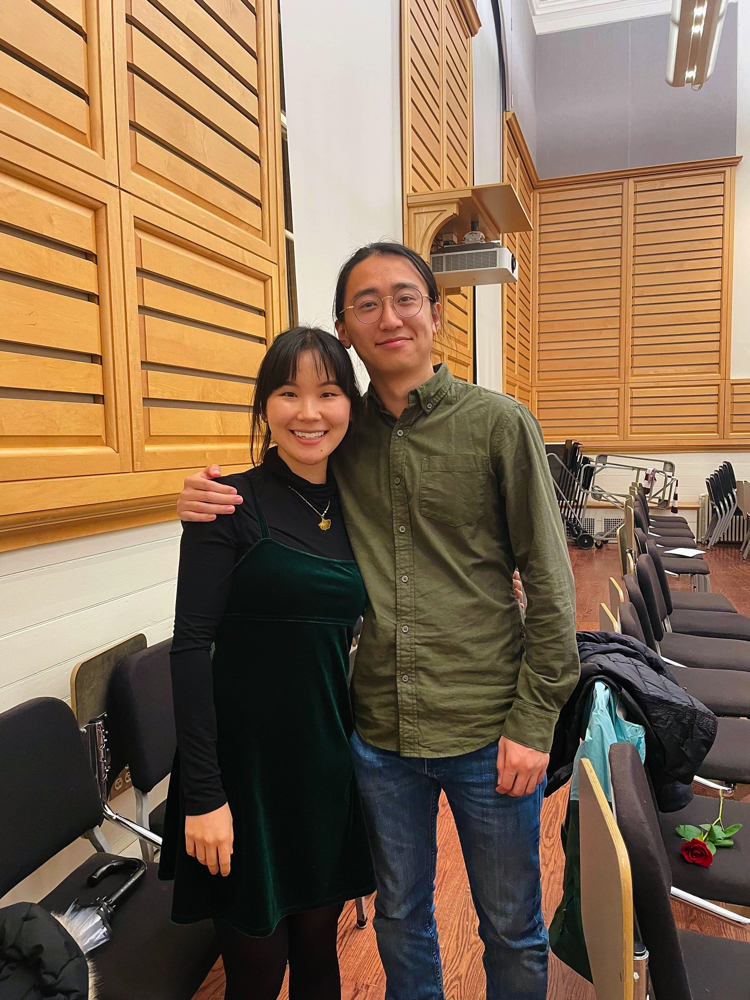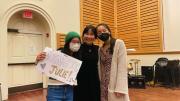Every Thursday evening of my first semester of medical school last fall, I commuted from Longwood to Cambridge for one of my favorite classes at Harvard. “Skills for Singing”—a non-credit, non-graded course for introductory singers—brings together students from across the University. Our 20-person class included an engineering graduate student who loved singing K-pop with friends, a first-year undergraduate who’d only ever sung privately in the shower, a Divinity School student who had given up choir as a child, a computer science concentrator who loved musical theater, and me: a first-year medical student whose musical skills had plateaued indefinitely since the age of 18.
The class is taught by Elizabeth “Liz” Eschen, a classical singer and director of the Harvard Holden Voice Program. She is the main reason why Skills for Singing usually has a waiting list of more than 100 people. Students find comfort in Eschen’s encouraging words, communicated with a voice that reminds one of story time on a colorful rug. I signed up after my friend Alison Chen ’23 raved about Eschen’s “healing approach to music.” Alison had taken music lessons as a child, and she stopped playing in part because she felt pressure and competition, “without any positive affirmation.” That’s something she hears a lot from other students at Harvard, too. But in Skills for Singing, she said, it was “really moving to have a teacher that really believes in me—it’s hard to come by.” Alison had never taken singing lessons before, but afterward she auditioned for and joined the Radcliffe Choral Society, where Eschen also serves as a teaching fellow and voice coach.
For Harvard students used to being “the best” at everything, Skills for Singing is as much an exploration of creative vulnerability and childish joy as it is a technical workshop on singing skills. In class, we’d buzz like bees or yodel through various scales, and every week, we whittled down, singing in groups of ten, then eight, then five, then two, until it was just one—our first solos. We had all sung alone in the shower or in the car with friends, but we hadn’t yet learned how to let go of our fear about performing solo in front of others. Singing is a psychosomatic process: air moves from the lungs, powered by the diaphragm, through the vocal cords, then through the mouth and nose. When fear restricts your air, tightening your throat and locking your jaw, your voice suffers.
For Shir Lovett-Graff, a fellow singer and Harvard Divinity School student, this fear has to do with exposing one’s non-expertise. “The culture of perfectionism at Harvard makes it hard to engage with exploring creatively and artistically,” Shir told me. “And because of the levels of imposter syndrome at Harvard, it makes it really hard for people to try things that they might not be good at—a lot of people feel very paranoid that they’re not supposed to be here in the first place.” Even though school is supposed to be a place where you enter as a beginner to gain more knowledge, at Harvard, there is an expectation that you’re selected for your existing expertise. And if you are not already an expert, you’re expected to become one by the time you leave.
Some students also feel they have no time to waste on activities that they’re “bad” at, given the pressure to optimize CVs and become the greatest within a particular field. Ivan Jara-Marquez ’23 is a pre-medical College student in my Skills for Singing cohort. “Culturally,” he said, “it’s difficult to try new things [at Harvard]. A lot of people have these plans and a lot of unspoken pressure to restrict yourself to those plans.” For him, singing was technically not “helpful” for his application to medical school, and it was a challenge to the status quo.
Maybe it is because of these cultural peculiarities at Harvard that Ivan, Alison, and I all delved deeper into our musical selves only after we were away from campus in 2020 and 2021, during COVID-19 restrictions. Ivan suddenly had too much time on his hands, which he spent learning basic music theory, piano, and guitar. Alison was isolated at home and looking for new creative outlets, so she signed up for the class on Zoom. And in early 2020, I was finishing up my senior spring in my parents’ Los Angeles home. My friends sent pictures of newly crocheted coasters, homemade pasta, embroidered sweatshirts, and watercolor paintings. Amateur art became a way to find meaning rather than an attempt to secure value in a global marketplace.
During this time, I picked up the guitar and sang with my dad and sister. We sang off-key, performing the same three songs over and over because we didn’t know how to play any others. And we practiced only when we felt like it. It had been three years since I had started learning the guitar, yet my fingers still fumbled through Bob Dylan’s “Don’t Think Twice It’s Alright,” and my ability to play the F chord was more dependent on luck than linear progress. But away from a campus where people were recording Spotify singles and attracting thousands of views on YouTube, I could sing and play to just be “good enough” for my friends and family. Music, for the first time in my life, became a way to express joy rather than expertise.
Last December, after about three and a half months of weekly classes, our Skills for Singing cohort gathered in Holden Chapel for our final recital. It was raining that evening, and we poured into the cozy chapel’s warm, open space with gratitude. There were red roses on a plastic table, one for each of us, provided by Eschen. For their solos, classmates sang Billie Eilish with soulful ease, a track from the musical Into the Woods with softness and lucidity, and Adele with husky intensity.
I chose to perform a jazzy love song. Although a few months of Skills for Signing hadn’t transformed my voice, I learned about all the aspects that make it unique. My voice is high, something I used to despise because I thought it made me sound less serious and professional. It quavers at the ends of phrases in a way that is sometimes beautiful, sometimes meek. It is soft—helpful in diffusing tense arguments but not for belting a riff. My voice can only change so much: at the end of the day, I sound like myself, even if I learn to hit all the notes and practice all the scales. Voice is one of the most recognizable facets of identity, shaped by genetics, development, and years of socialization. My skull and nostrils are a particular size, my vocal cords a particular strength and thickness, and so my voice more or less is just the way it is. I can’t wait 20 years, until practice makes perfection, before sharing it with others. My voice is my voice not despite its constraints, but because of them.
Before our recital, Eschen had reminded the class that even the most seasoned soloists come down with “pre-performance jitters” before every concert. I was optimistic, believing that I might somehow be exempt given the level of trust between me and my classmates. Standing in front of the small audience of fellow singers and guests, the nerves still hit me. After Eschen’s piano intro, I quietly slid into the start of my solo, quavering in way I hoped sounded more like vibrato than nerves. Holden Chapel was acoustically much more resonant than our classroom—“very forgiving” of our voices, Eschen said. So as my voice grew, I discovered colors and edges I had never heard before. While I took a breath in the wrong spot and missed my cue after an accompaniment interlude, I hit every note, even if breathy on the high D and barely audible on the low F. In the audience, my partner recorded my performance, and two friends from college, who had shown up as a surprise, held up a sign that said, “Sing it, Julie!” That I, a 25-year-old beginner singer, was given the chance at a solo performance feels like one of the most indulgent and treasured experiences of my adult life.

The author with her partner, Liren Ma
Photograph courtesy of Julie Chung
These days, I feel what philosopher Kate Soper calls “avant-garde nostalgia” for the pandemic’s early days. Amidst its difficulties, we celebrated each other’s misshapen sourdough loaves and newly knit scarves. Now, professionalization has kicked in, threatening to squeeze out that childish joy and creative vulnerability. Medical students are taught to uphold the “growth mindset,” a commitment to perpetual improvement that prevents us from simply accepting our limits. Yet at a school with immense resources and opportunities, the prospect of limitless growth and unlimited freedoms can seem overwhelming. The gears of Harvard are doing everything they can to get back to economic and professional growth, but I’ll do my best to stay stuck, content with my mediocre place in music for the rest of my life. And from that noisy but joyous spot filled with my friends and family, I will sing (off-key) to the world.









